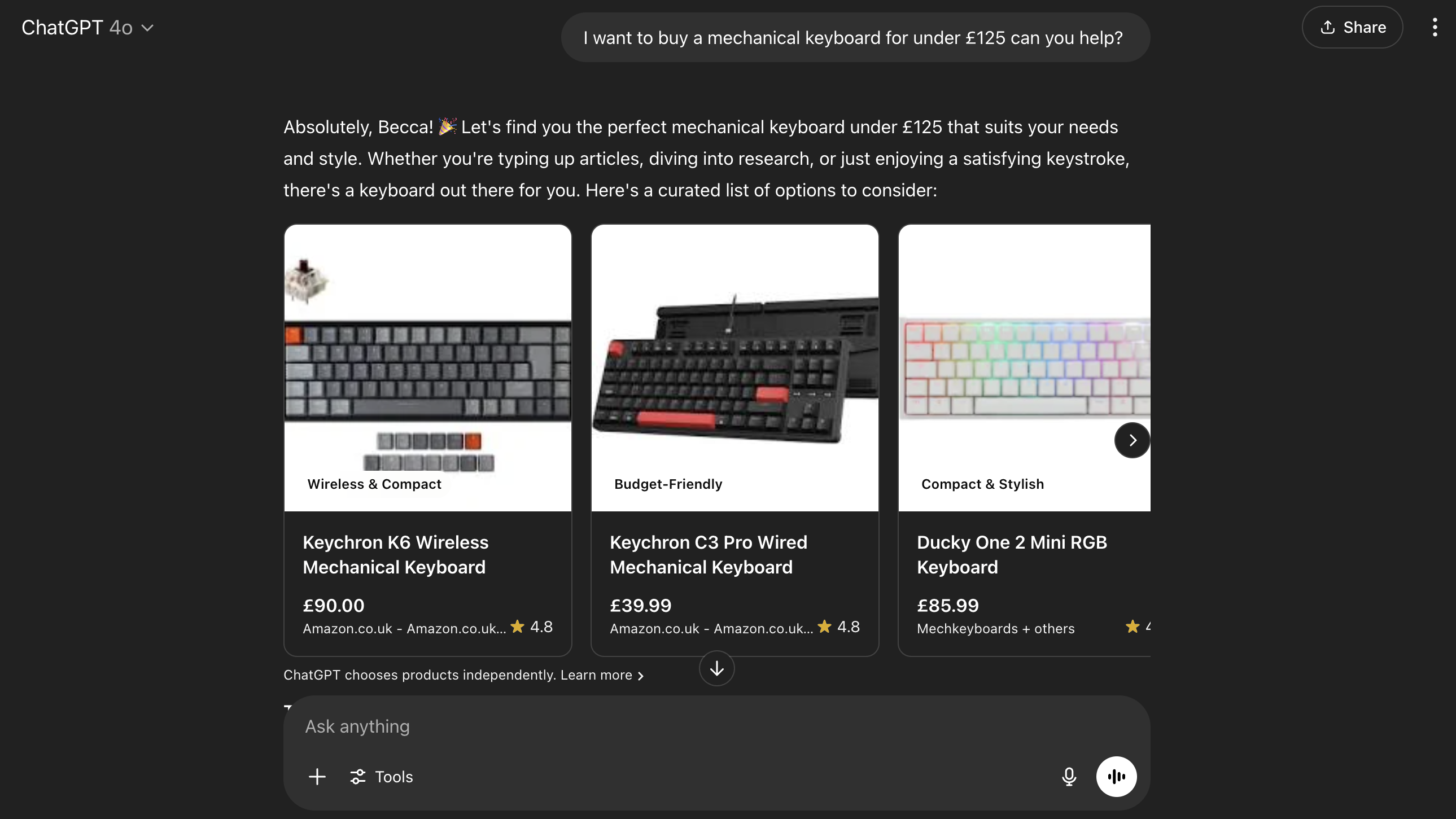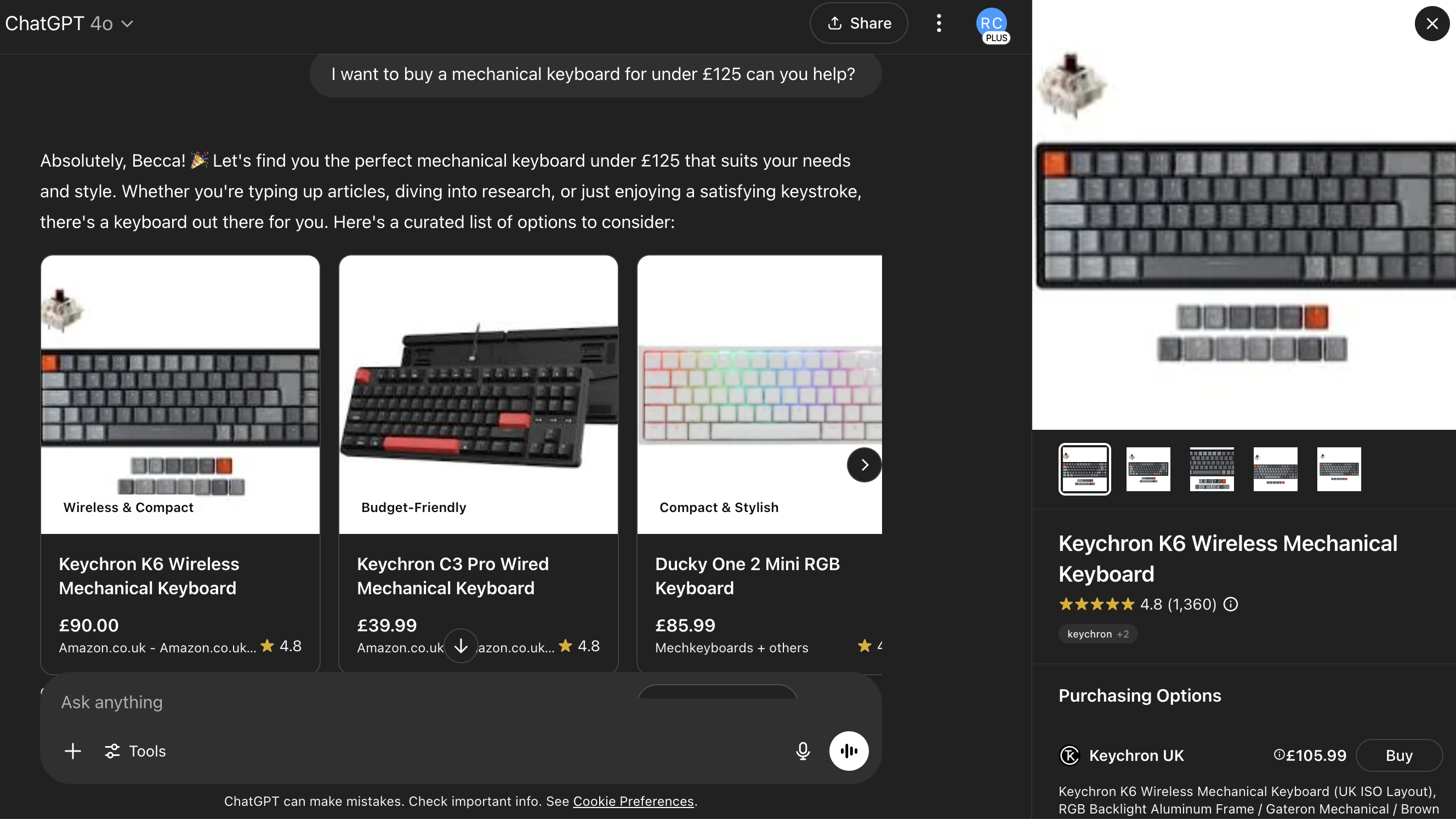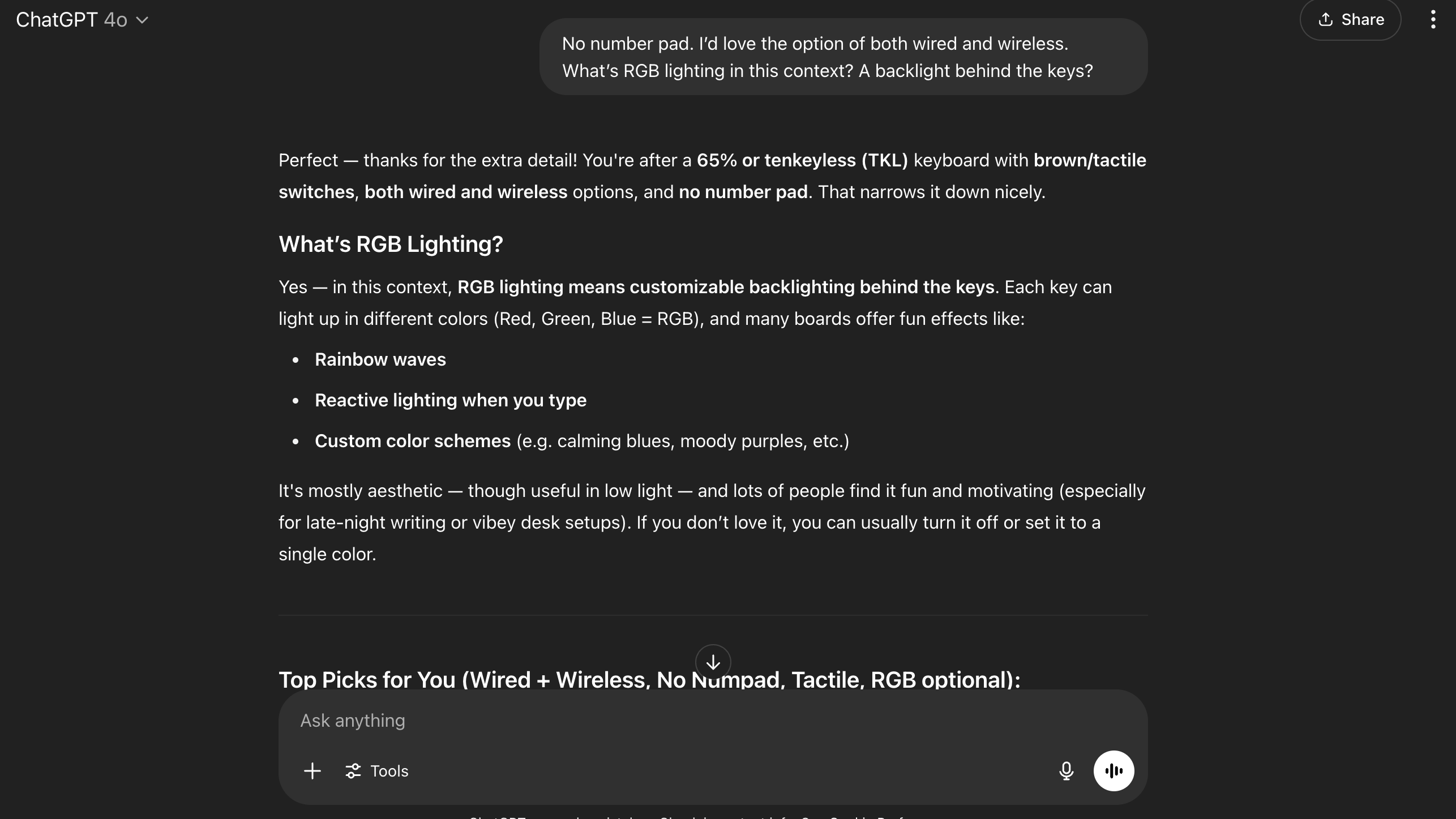I tried ChatGPT’s new shopping feature – here’s what it's like and how to use it
ChatGPT’s shopping tool is smart, helpful, and a little too easy to rely on

OpenAI has rolled out a new shopping feature inside ChatGPT. Think of it as a built-in assistant that can scan through countless reviews and recommendations in seconds, helping you find and compare products without ever leaving the chat.
The feature is available to all users, both free and paid, and it’s been rolling out across different regions. So, how does shopping with ChatGPT actually work? Does it make buying things easier? And could this be the future of how we shop?
What it’s like to shop with ChatGPT

To test it, I didn’t need to press a button or activate anything special, I just started typing in ChatGPT. I’ve been mildly obsessed with mechanical keyboards lately, so I wrote: “I want to buy a mechanical keyboard for under £125 can you help?”
That was all it needed to get going. Any shopping-related prompt, like “Find me…,” “What’s the best… to buy,” or “I’m looking for…” triggers the new shopping feature automatically.
ChatGPT responded with a carousel of product suggestions. Each option included an image of the keyboard, its product name, a star rating (mostly sourced from Amazon), a price and a short description highlighting key features, like “compact & stylish,” “entry-level,” or “budget-friendly.”
Clicking on a product revealed more detail, including a selection of images and linked me directly to a few retail websites to complete the purchase. (For now, you can’t buy directly within ChatGPT – and personally, I like that. I still want to browse the final product page before checking out.)
Scroll down further and there was a “Why you might like this” section, a short summary of why that particular product was picked for me. There was also a “What people are saying” section, a summary of key features with snippets of text from other websites, including Reddit, Amazon reviews and tech website reviews.
Sign up for breaking news, reviews, opinion, top tech deals, and more.
Beneath the carousel there was more detail. A section called “Top Picks Explained” offered mini justifications for each recommendation, along with links to third-party sources if I wanted to dig deeper. Under that, a section titled “Considerations” broke down key factors, like layout size, connectivity, and switch type, the main things you’d want to weigh up when buying a mechanical keyboard.
Why shopping with ChatGPT is so appealing
If you’re someone who gets overwhelmed by the endless process of comparing products across sites, shopping with ChatGPT feels like a shortcut. Especially compared to Googling, clicking through ten links, opening five tabs, reading Amazon reviews, tech review websites, Reddit threads – and then giving up because there’s just too much information.
ChatGPT acts like a filter, simplifying the shopping experience down to a handful of well-matched suggestions. And because it’s a conversation, you can ask follow-up questions to refine your search even more.

In my case, I didn’t know much about mechanical keyboards beyond wanting that classic clickety-clack sound. So I told ChatGPT that. It asked for more details, like my preferred size, layout, switch type, and narrowed down the options accordingly. It felt genuinely helpful and surprisingly tailored to me.
Another plus is that these results don’t appear to be ad-driven. They’re pulled from a mix of third-party retailers, editorial reviews and community platforms like Reddit. This will be appealing to some people, as some shopping tools online are filled with ads or sponsored content, and it’s not always easy to tell what’s been paid for. OpenAI says that listings in ChatGPT aren’t sponsored, and it doesn’t currently receive money from purchases made from these recommendations.
For people who feel sceptical about online recommendations, this could be a key selling point. As long as it stays ad-free, it may feel more organic and trustworthy than search engines or shopping sites that surface paid results first.
Where ChatGPT falls short – and why it matters
That said, it’s not doing anything groundbreaking on the surface. It’s not testing products or uncovering hidden gems – other people are doing that hard work. What it is doing is gathering, synthesizing, and presenting information in one place in a conversational, intuitive way. That simplicity is, in a way, part of the innovation.
But how do we really know what’s feeding these suggestions? Reports suggest that ChatGPT’s shopping tool pulls data from a mix of sources, including public product ratings, editorial reviews (like those here on TechRadar), community forums (like Reddit), and online retail catalogues. You can even guide the assistant to prioritize certain types of reviews over others. That’s a good level of transparency. But I still found myself wondering, how wide is the net it’s casting? And what gets filtered out?
There’s also the broader question of trust. As a tech journalist, I know the value of expert testing – especially for gear like keyboards, where feel, performance and real-world context matter. There’s something reassuring about reading a review from someone who’s actually used the product, tested it and explained its quirks. ChatGPT can’t do that.
For me, this tool works best as a first filter. A way to cut through the noise and reduce thousands of options to a manageable few. But I still want to cross-reference, read full reviews and hear from people whose opinions I trust – I’d urge everyone reading this to do the same.
The future of decision-making is here, but are we ready?
Many people already use ChatGPT for research. It makes sense that they’d also turn to it for researching what to buy, and the new shopping feature makes that even easier.
With memory features becoming more advanced, ChatGPT may also soon be able to remember your preferences and purchasing habits. That means it might already know you’d hate loud switches on a new keyboard or have a tiny desk so would only love compact layout options – and then tailor suggestions accordingly, without you needing to repeat yourself. That level of personalization could shift how we shop entirely.
It’s not just OpenAI moving in this direction. Perplexity, an AI chatbot with a research focus, now offers shopping recommendations to paid users through a partnership with Visa. Google is doubling down on its AI-powered search tools too, with shopping expected to be a key part of that evolution. The vision is clear, AI isn’t helping you shop, it’s also helping you decide.
For me, that’s where things get more complicated. I’ll admit, I liked the help. Sometimes, I just want someone (or in this case something) to tell me what to buy. I’m tired. We’re all tired. And maybe that’s the appeal, not just for shopping but for life more broadly. ChatGPT doesn’t just show you options, it reduces decision fatigue and gives you one less thing to worry about.
But that outsourcing of decision-making, even in small ways, adds up. The more we turn to AI to streamline the noise and simplify our lives, the more we need to ask where we draw the line. What happens when convenience becomes more important than curiosity? Or when ChatGPT’s personalized suggestions replace real research or genuine recommendations from real people we know and trust? If AI is shaping what we buy, and how we buy it, we also need to stay aware of who’s building these systems, what they prioritize and what’s being left out.
You might also like

Becca is a contributor to TechRadar, a freelance journalist and author. She’s been writing about consumer tech and popular science for more than ten years, covering all kinds of topics, including why robots have eyes and whether we’ll experience the overview effect one day. She’s particularly interested in VR/AR, wearables, digital health, space tech and chatting to experts and academics about the future. She’s contributed to TechRadar, T3, Wired, New Scientist, The Guardian, Inverse and many more. Her first book, Screen Time, came out in January 2021 with Bonnier Books. She loves science-fiction, brutalist architecture, and spending too much time floating through space in virtual reality.
You must confirm your public display name before commenting
Please logout and then login again, you will then be prompted to enter your display name.